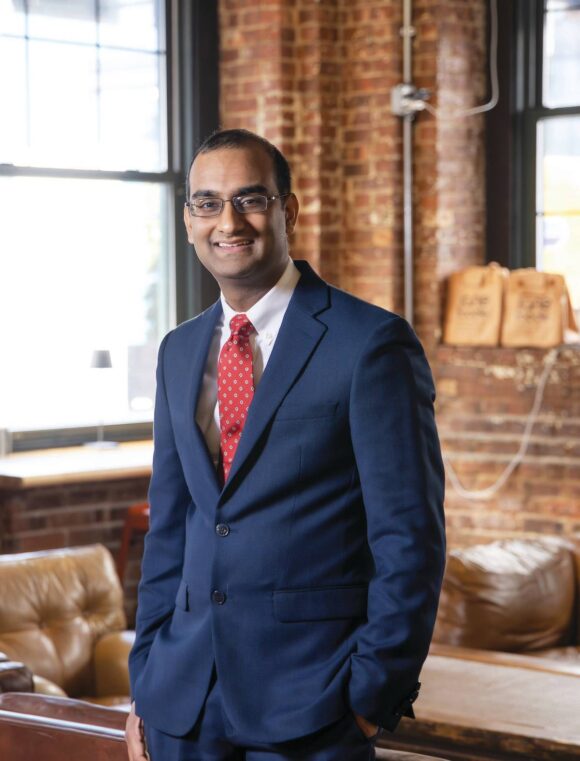
Rishi Jaggernauth, at left, during the 2012 Cook Community Day event with former SEBS Campus Dean for Undergraduate Education Barbara Turpin and classmate Julianne Davis (SEBS’15).
Rishi Jaggernauth earned a bachelor’s degree in biotechnology from Rutgers School of Environmental and Biological Sciences (SEBS) in 2015, with a concentration in Bioscience Policy and Management, along with a minor in Environmental and Business Economics.
“Growing up, there was a strong emphasis on education in our household. My parents instilled in us the importance of learning and encouraged my two sisters and me to explore careers in healthcare, which has significantly shaped my own academic and professional path.”
Both of Rishi’s parents hold college degrees—his mother worked as a medical technician while his father was an IT systems analyst. Like him, his siblings are proud Rutgers alumni – his older sister Smita from the Ernest Mario School of Pharmacy (Class of 2017) and his younger sister, Karishma, from the School of Arts and Sciences (Class of 2017).
Initially, Rishi came to SEBS with the intention of attending medical school. However, during his junior year, he discovered that his passion lay more at the intersection of life sciences and business.

Rishi Jaggernauth.
“This pivot allowed me to focus on how biotechnology can drive innovation in healthcare and other industries. I’m grateful for the experiences and insights I gained at SEBS that helped shape my career path.”
Rishi found his SEBS experience to be incredibly enriching, particularly in terms of exposure to meaningful research as an undergraduate. For two summers and throughout his sophomore year, Rishi had the opportunity to work in the Lobel lab at the Center for Advanced Biotechnology and Medicine (CABM), focusing on Batten Disease, also known as Late Infantile Neuronal Ceroid Lipofuscinosis.
“I was fortunate to work with Dr. Peter Lobel and Dr. David Sleat and the wonderful members of the Lobel lab, who discovered the genetic cause of Batten Disease and developed a treatment method that was licensed to BioMarin Pharmaceuticals, leading to the approval of the first FDA-approved treatment for the disease, Brineura.”
Rishi found this research experience very enlightening. “Not only did I realize that a traditional wet lab and graduate school experience were not my calling, but I also gained the understanding that this work in translational research provided me with a solid understanding of the early stages of drug development.”
For his George H. Cook senior honors thesis, Rishi had the good fortune to do health policy research under Dr. Karen Zurlo at the School of Social Work.
“While this project was quite different from the applied research at CABM, it taught me how to dive deeply into literature, formulate research questions, analyze datasets and pursue my intellectual curiosity in healthcare policy.”
By embracing both enriching but very different undergraduate research experiences, he gained a range of skills that have aligned well with his passion and his profession working in rare disease commercialization
After graduating from Rutgers, Rishi earned an MBA from NYU Stern School of Business, which provided him with incredible experiences, including an internship at Regeneron Pharmaceuticals, where he currently works.
“I co-lead healthcare professional marketing efforts for EVKEEZA, a drug for homozygous familial hypercholesterolemia—a rare lipid disorder characterized by extremely high cholesterol levels. Additionally, I serve as the marketing lead for VEOPOZ in the CHAPLE indication, a rare immune disease with fewer than 100 known patients worldwide.”
While challenging, Rishi believes that SEBS prepared him with a strong academic foundation and interdisciplinary coursework that were truly invaluable. “Professors like John Italia from the Department of Agricultural, Food and Resource Economics, illuminated the possibilities of a career in the corporate world for me. The Biotechnology program was an incredible experience—highly rigorous and intellectually stimulating. Dr. Barbara Zilinskas was a personal mentor, and her significant impact on the program greatly shaped my academic journey.”

Rishi Jaggernauth, second from left, with colleagues celebrating the Lunar New Year.
Several of his SEBS classmates are also his closest friends and the close-knit campus community, even at a large state school, made him feel supported.
“Additionally, I honed my skills in organizing information, connecting the dots and presenting effectively. My ability to visualize data and convey information was further refined at SEBS. This skill has been particularly beneficial in my career, especially when my presentations reach senior leadership, including the CEO of Regeneron. Overall, SEBS equipped me with the tools and mindset necessary for success in my field.”
Almost a decade since graduating from SEBS, Rishi has gained valuable insights that he shares readily with undergraduates looking to pursue a career in Biotechnology: focus on working at the intersection of disciplines.
“A blend of experiences and coursework in the life sciences and business made a significant difference in my career. I never imagined I’d end up in marketing, having taken only one course prior to my role at Regeneron. However, I followed interesting people and pursued opportunities as they arose, which ultimately led me to where I am today. Explore rotational programs and other similar opportunities for you to get many experiences early on as they can be invaluable in informing where you will go next.”

